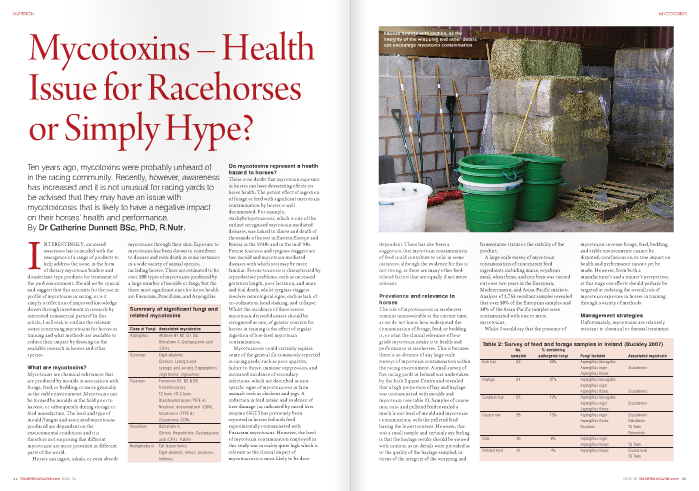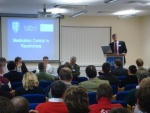The TRM Trainer of the Quarter - Dermot Weld
The TRM Trainer of the Quarter goes to Dermot Weld from his Rosewell House base just yards fro Curragh he has left his mark on racing all over the world, winning major races on four different continents. 2010 has been a rewarding year for Weld and his team so far and with undoubted big-race entries to look forward to the Autumn.
Sophie Hull (European Trainer - Issue 31 / Autumn 2010)
Tackling the Carbon Hoofprint - what racehorse trainers can do
CLICK ON IMAGE TO READ ARTICLE
Yes, there is a possible legal solution to racing’s financial problems
CLICK ON IMAGE TO READ ARTICLE
Harmonising the rulebook - how can racing be improved?
A harmonised rulebook across the globe would benefit racing, writes Katie Roebuck, but with the world unable to agree on more pressing issues such as climate change or the economic crisis, how easy would it be to implement?
Katie Roebuck (European Trainer - issue 29 - Spring 2010)
Keeping it in the family - can a horse's family traits be used to a trainer's advantage?
It’s the same story at every dinner party, writes Frances J. Karon. A stranger will invariably ask, “What do you do?”, as if the response will somehow explain the very essence of one’s being. Similarly, the first question we have for the owner or trainer who tells us he has a nice yearling on the farm is, “What’s it by?”
The question is multifunctional. First, it enables us to gauge how seriously we can take this person. We will immediately discount the proud owner's opinion if the horse is by a bad stallion. Second, we make a generalisation based on the reply. If, for instance, the yearling's sire is Theatrical, we tell ourselves that it will obviously be a slow maturing turf horse who will want a route of ground.
Frances J Karon (European Trainer - issue 29 - Spring 2010)
Nina Bach - up and coming female German racehorse trainer
After winning more than 100 races as an amateur and then as an apprentice jockey, Nina Bach set up as a trainer in 2004 in the Rhineland-Palatine in Germany. Through hard work and a level head she has had an upward curve of success ever since.
David Connolly-Smith (European Trainer - issue 29 - Spring 2010)
The 2009 European Trainers’ Federation AGM
The 2009 AGM was held at The Churchill Hotel in Portman Square, London in December. As always the AGM proved to be a useful forum to discuss issues from across Europe which affect trainers.
Swedish Racing - the head of Taby Galopp suggests inner-city racing
Imagine a handful of race meetings every summer in Richmond Park in London or Central Park in New York, writes Geir Stabell, on turf strips that have simply been rented by the racing authorities, to show off the sport to a wider audience. A sort of a science fiction idea, far removed from the realities of horseracing? Not necessarily.
Täby Galopp, the principal of three racecourses in Sweden, sits less than 20km from the centre of the capital Stockholm, and is thus closer to the heart of the nation than most other racecourses in Europe. Still, plans are in motion to move the racecourse. There are both fascinating and interesting plans, based on new ideas, as Täby Galopp's new managing Director Dag Johansson explains: "We may one day have one venue right in the middle of the city, for three to four big events per year, supported by a 'bread and butter' venue further away from the city.
Geir Stabell (European Trainer - issue 29 - Spring 2010)
Tying up some loose ends on rhabdomyolysis - can nutrition help treat or prevent tying up?
A horse with raised muscle enzymes is always a cause for concern for trainers, whether it is a single isolated incident or a regular occurrence.
There has been a slow but steady increase in our knowledge of this disease or syndrome, which in more recent years has been helped by the application of genetic-based tests for some forms. An increase in our understanding of the metabolic basis for the syndrome is imperative and will help us to better manage these horses in terms of nutrition and training.
Catherine Dunnett (European Trainer - issue 29 - Spring 2010)















